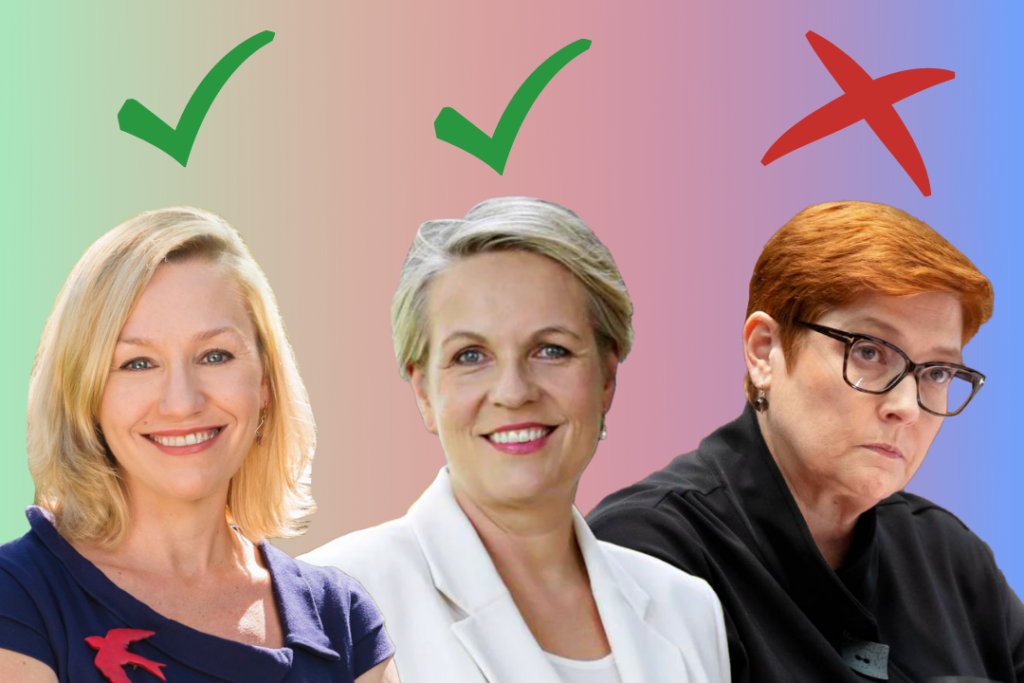The plethora of issues impacting Australia’s women and families has dominated public and political discourse for well over a year, with catalysts for change including the alleged rape of former Liberal staffer Brittany Higgins inside Parliament House, a slew of sexual misconduct allegations levelled at senior government ministers, and the rapid escalation of domestic and family violence rates during the pandemic.
Of course, there are a host of other areas that need urgent attention: the rapid rate of homelessness afflicting women over 55, a dismal paid parental scheme that does little to support gender-fair workforce participation and a childcare system that has costs rising so quickly that thousands of families simply opt out of considering it a viable option.
Women represent 51 percent of Australia’s population, and yet, four weeks into this election campaign, we’ve barely scratched the surface on where the two major parties stand.
So when Women’s Agenda approached the three party leaders heading up women’s portfolios, including Greens Senator Larissa Waters, Labor Minister Tanya Plibersek, and Liberal Minister Marise Payne for a debate on these issues, we expected there’d be willing appetite to take part.
And that was certainly the case for both the Labor Party and The Greens, with the media teams for Plibersek and Waters coming back within hours to confirm their participation and flexibility with timing.
Unfortunately, we heard nothing from the Minister for Women herself, Marise Payne. And when followed up with two days later, I was met with notable hostility from the Adviser to the Minister who informed me that the invitation had been reviewed and swiftly rejected, with an added mocking accusation that “Women’s Agenda does not provide balanced journalism”.
(Just a reminder that Women’s Agenda is the leading, independent news outlet in Australia owned and run by women, with zero outside investment. Our only agenda has ever been ensuring that the issues impacting women are reasonably represented– a mission we’ve carried through for the last ten years, running alongside media giants).
When I queried whether the Minister for Women would be speaking out on women’s issues ahead of the election, noting her odd absence thus far, the question was dismissed, with a suggestion that I simply refer to the government’s gap-ridden budget statement.
We followed up with Minister Jane Hume, as well as Minister Anne Ruston to see whether they’d be open to filling in on Payne’s behalf, but we were told Hume was too busy while Ruston’s team is yet to respond.
It’s a disappointing outcome given the gravity of these policy areas. For months, women in this country have been calling for widespread change. We’ve been calling for our government to step up and take action to save lives. The fact this is still being met with such palpable resistance is shameful.
And while both major parties are falling short on being where we need them to be, it’s fair to say that in recent days Labor has geared up its rhetoric around women and the ways in which it plans to alleviate pressure.
Their childcare policy is a big ticket item in which no Australian family will be worse off than they currently are. They’ve committed to lifting the subsidy rate to 90 percent for families with at least one child in care and are working toward a universal system of early childhood education that will go a long way to supporting families, children and educators into the future.
They’ve also announced widespread reviews into the wages and wellbeing of feminised industries like early childhood education, nursing and aged care with Labor leader, Anthony Albanese supporting workers’ calls for better pay at the Fair Work Commission with a Labor Government funding the outcome of this case.
On women’s safety, Labor has committed to adopting all 55 recommendations of Kate Jenkins’ Respect at Work Report, ensuring that direct measures are taken to address and stop sexual harassment at work; a scourge that costs the Australian economy $3.5 billion a year.
Sadly, none of the above, are measures that a Coalition government has pledged as policy items for this election.
When asked about the concerns and voting power of women during last night’s debate on Nine’s 60 Minutes, Prime Minister Scott Morrison stumbled over a basic statistic surrounding domestic and family violence, suggesting that one in eleven women will lose their lives to the crisis in Australia. The correct citation is actually that one woman every eleven days will lose her life to domestic and family violence– something which is actually elevated this year, with at least 18 women over 18 weeks killed.
Morrison also mentioned the Coalition’s $53m investment into women’s health and IVF, drawing on his and wife Jenny’s personal experience of facing fertility issues.
But frankly we need more than policy tinkering and platitudes.
On May 21, only two weeks away, we’ll be heading to the ballot box to cast our vote. Women will not be ignored this time around. The fact that this government still doesn’t seem to grasp that, could (and should) be the nail in its coffin.
Women’s Agenda will be launching its first-ever Women’s Election Tracker later today! Stay up to date on every female candidate running at this election as well as the policy areas they represent. Stay tuned.


